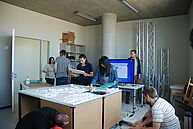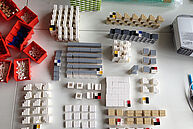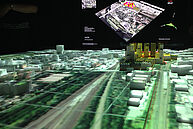Workshops
Together with the City Science Group at MIT Media Lab, the CSL is organizing interdisciplinary workshops for HCU students. In these, different questions about the interaction of the urban and digitization are being discussed and further developed on CityScopes. For HCU students, it is a good opportunity to get to know the working methods of MIT Media Lab and to explore the possibilities of CityScopes.
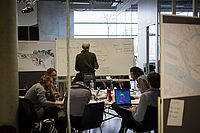
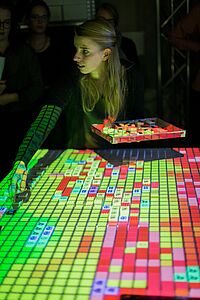
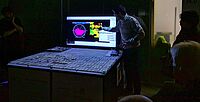
Tobias Holtz, Michael Koch, Dieter Läpple, Ariel Noyman, Ryan Yang
During the workshop a concept for an innovation district was developed for the area of Rothenburgsort. The concept was presented, tested and evaluated by using an interactive city- model called “CityScope”. For the concept three modules were developed and linked to each other:
- an innovative mix of living and working; in the context of the changing nature of work and manufacturing, the possibilities and potentials of design, urban production, migrant economies, rapid prototyping (3D-printing)/FabLabs and smart factories shall be tested and related to new types of housing;
- new models for creative communities and neighborhoods with a high social diversity; based on new urban spaces and new housing projects, which are strengthening the resident’s self-help and the application of digital technologies and services;
- a concept for the district regarding proactive health and wellness; by identifying the health-endangering factors (e.g. air pollution and noise exposure) a concept for health promotion and health prevention shall be developed. The existing health care structures are supposed to be connected, complemented and further developed through different forms of citizen participation.
ERROR: Content Element with uid "109149" and type "media" has no rendering definition!
Tobias Holtz, Katrin Hovy, Ariel Noyman
The workshops focused on Rothenburgsort; it provided students with a hands-on opportunity to develop an advanced technological platform for urban planning, design and architecture. The platform supports decision-making in an evidence-based process, accessible by both experts and non-experts. HCU faculty, researchers and students, in association with MIT, used the Rothenburgsort neighborhood as a case study to test and develop the platform on real-life subjects, such as housing shortages, innovation and entrepreneurial development, urban mobility, walkability, quality of life and more.
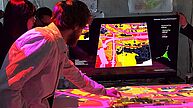
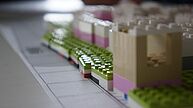
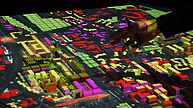
ERROR: Content Element with uid "108661" and type "media" has no rendering definition!
Tobias Holtz, Ira Winder
As part of the cooperation between MIT and HCU, the first urban model of this kind was built in an interdisciplinary student-workshop using Lego bricks as well as traditional materials. On a surface covering more than 2 sqm, the model displays parts of Hamburg-Rothenburgsort, which is currently in the focus of prospective urban development. By placing optically tagged Lego bricks simulating different building types on the CityScope, changes to the city are visually revealed in real-time by changing color-codes projected onto the pieces. Different variables such as walkability, access to jobs, housing and open space can thus be easily measured.


